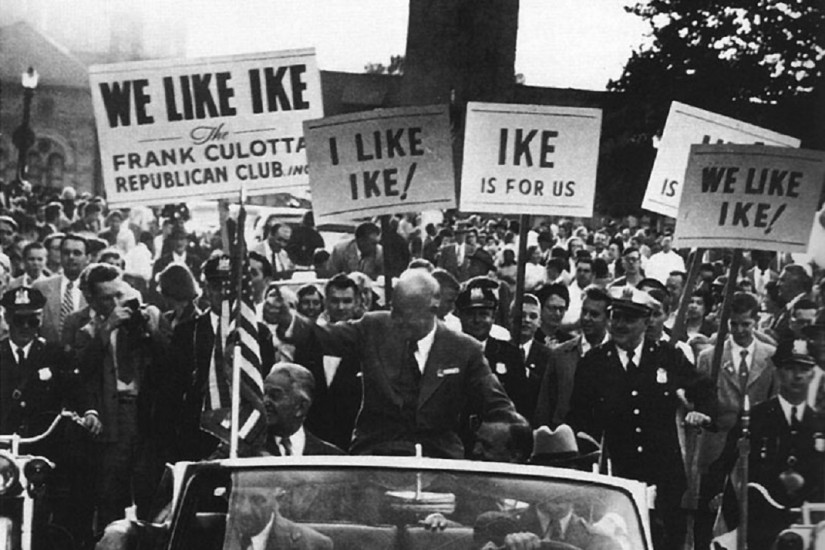The religious overtones of Eisenhower's inauguration echoed throughout his first hundred days. Just take a look at the first week of February 1953:
On Sunday morning, Eisenhower became the first president ever to be baptized while in office, taking the rite before the congregation of the National Presbyterian Church. That same night, he broadcast an Oval Office address for the American Legion's "Back to God" ceremonies, urging the millions watching at home to recognize and rejoice in the spiritual foundations of the nation.
On Thursday, Eisenhower was the guest of honor at the first-ever National Prayer Breakfast. Now an annual tradition, the first event, hosted by hotel magnate Conrad Hilton, took the theme of "Government Under God." The convening pastor led a "prayer of consecration" for Eisenhower, who then offered brief remarks of his own. In them, he stressed his belief that a free government had to be "embedded soundly in a deeply-felt religious faith or it makes no sense."
On Friday, Eisenhower made clear that he would turn those words to deeds, instituting the first-ever opening prayers at a Cabinet meeting. The president believed deeply in the power of prayer, and his Cabinet – whose ranks included both an elder in the Presbyterian Church and one of the twelve-man ruling council of the Church of Jesus Christ of Latter-Day Saints – readily welcomed the tradition. Still, it took some time before the new practice became a natural habit for them. Ike's secretary recalled the president emerging from one session only to slap his forehead and exclaim: "Jesus Christ, we forgot the prayer!"
That was just one week. And the themes that unfolded there were echoed across the president's first hundred days and then throughout his presidency, as Eisenhower led the nation in a religious revival that was nothing short of revolutionary. In the summer of 1953, for instance, the president, Vice President Richard Nixon and members of their cabinet welcomed leaders of the National Association of Evangelicals to the Oval Office. The special occasion was a signing ceremony, in which the president declared that the government of the United States of America was based on biblical principles detailed in the 23rd Psalm.
The rest of the Capitol consecrated itself, too. In 1954, Congress followed Eisenhower's lead, adding the words "under God" to the previously secular Pledge of Allegiance. They put the phrase "In God We Trust" on a postage stamp for the first time that same year, and then on paper money the following year; in 1956, it became the nation's first official motto.
By fusing together faith and freedom, Ike's first hundred days remade the nation in a way that rivaled FDR's revolution in significance. From that vital opening act of his administration, and then throughout the length of his presidency, Americans were told, time and time again, that their country not only should be a Christian nation but that it had always been one. In a lasting triumph for Eisenhower, they soon came to believe that the United States of America was "one nation under God."
